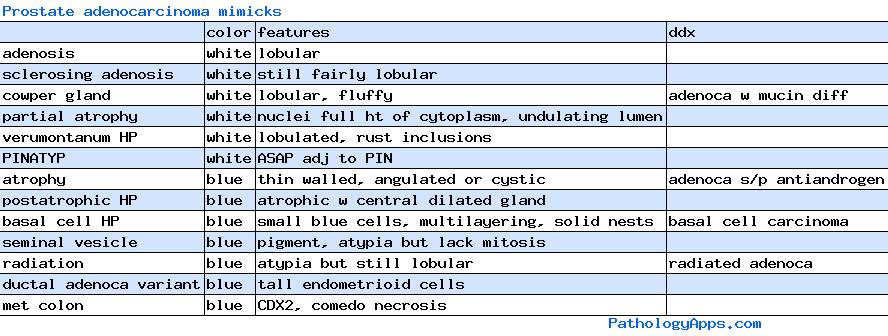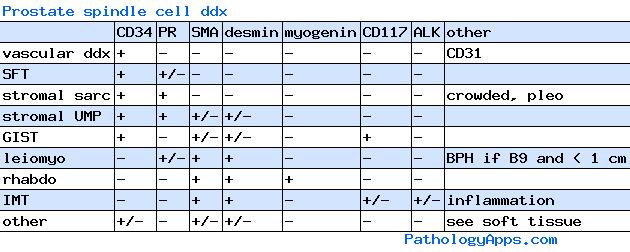prostate






Expand All | Collapse All
Normal
- zones
- transition zone: surrounds prostatic urethra, adjacent glands may have urothelial metaplasia
- central zone: surrounds ejaculatory ducts, glands here are complex and may mimick cribriforming
- peripheral zone: posterior and lateral
- regions
- anterior: fibromuscular stroma
- posterior: contains the zones, cancer occurs here, especially transition and peripheral zones
- apex
- base
- bladder neck: smooth muscle
- seminal vesicles: has small invaginations mimicking malignant glands, muscular stroma, has pigment
- glands
- 2 layers
- secretory cells: PSA+
- basal cells: p63+
- glands are large, intraluminal complexity
- fibromuscular stroma
- other
- contains skeletal muscle
- ganglion cells in extraprostatic tissue mimicks carcinoma
Approach
- PIN mimicks
- PIN
- basal cell hyperplasia
- complex glands (base, ejaculatory duct, seminal vesicle, BPH)
- Gleason 3 mimicks
- Gleason 3
- (partial) atrophy
- ASAP
- ductal carcinoma
- seminal vesicle adenocarcinoma
- Gleason 4 mimicks
- Gleason 4
- intraductal carcinoma
- complex glands
- Gleason 5 mimicks
- Common benign
- BPH
- prostatitis
- BCG effect
- complex glands
- Metastasis, soft tissue, hematolymphoid
Non-neoplastic
WHO neoplasms
- Epithelial
- glandular
- urothelial carcinoma
- squamous
- basal cell
- Neuroendocrine
- Prostatic stromal tumors
- stromal tumor of uncertain malignant potential
- stromal sarcoma
- Mesenchymal
- Hematolymphoid
- lymphoma
- leukemia
- Treatment effect
- Misc
- cystadenoma
- Wilms tumor
- rhabdoid tumor
- GCTs
- yolk sac tumor
- seminoma
- embryonal carcinoma
- teratoma
- choriocarcinoma
- clear cell adenocarcinoma
- melanoma
- Metastasis
Seminal vesicle tumors
- Epithelial
- seminal vesicle adenocarcinoma
- cystadenoma
- Mixed epithelial and stromal tumor
- Mesenchymal
- Misc
- choriocarcinoma
- male adnexal tumor of probable Wolffian origin
- Metastasis
Grading
- Gleason
- Gleason 3 = discrete glands
- Gleason 4 = fused, cribriform glands
- Gleason 5 = solid sheets, single cells, comedo necrosis, karyorrhexis
- Total score for bx: most prevalent grade + 2nd or 3rd most prevalent pattern (pick the higher grade out of the two)
- For resections: give all grades and percent of each
- Grade group
- 1: Gleason score 3+3=6
- 2: Gleason score 3+4=7
- 3: Gleason score 4+3=7
- 4: Gleason score 8
- 5: Gleason 9, 10
- Bx caveats
- lower grade < 5% are ignored (Eg. 4+3 with minute 3 becomes 4+4)
- For Gleason 4+3 or 3+4, give % that is Gleason 4
- Gleason 4 has worse prognosis if has cribriform, so comment
- For bx, grade separately for each bx location
- Resection caveats
- For multifocal resections, note each foci, but overall staging purposes, pick the worst from each nodule
- For resections, if tertiary grade is < 5%, change wording to minor high grade pattern
TNM (using for grossing)
- T1: microscopic
- T1a: incidental tumor, <= 5% specimen
- T1b: incidental tumor, > 5% specimen
- T1c: tumor on needle biopsy
- T2: prostate confined (including capsule)
- T2a: unilateral, <= half of the involved side
- T2b: unilateral, > half of the involved side
- T2c: bilateral
- T3: extraprostatic extension
- T3a: extracapsular extension, including microscopic bladder neck involvement
- T3b: seminal vesicle invasion (into muscular wall, not just surrounding stroma)
- T4: adjacent structure invasion
- bladder neck
- external sphincter
- rectum
- levator muscles
- pelvic wall
- M1: metastasis
- M1a: nonregional lymph node(s)
- M1b: bone
- M1c: other sites
Stage
- I
- T1-2a, PSA < 10, Gleason <= 6
- T1-2a, PSA and Gleason unknown
- IIA
- T1a-c, PSA < 20, Gleason 7
- T1-2a, PSA >=10 <20, Gleason <= 6
- T2a, PSA < 20, Gleason 7
- T2b, PSA < 20, Gleason <= 7
- T2b, PSA and Gleason unknown
- IIB
- T2c
- T1-2, PSA >= 20
- T1-2, Gleason >= 8
- III: T3a-c
- IV: T4 or N1 or M1
